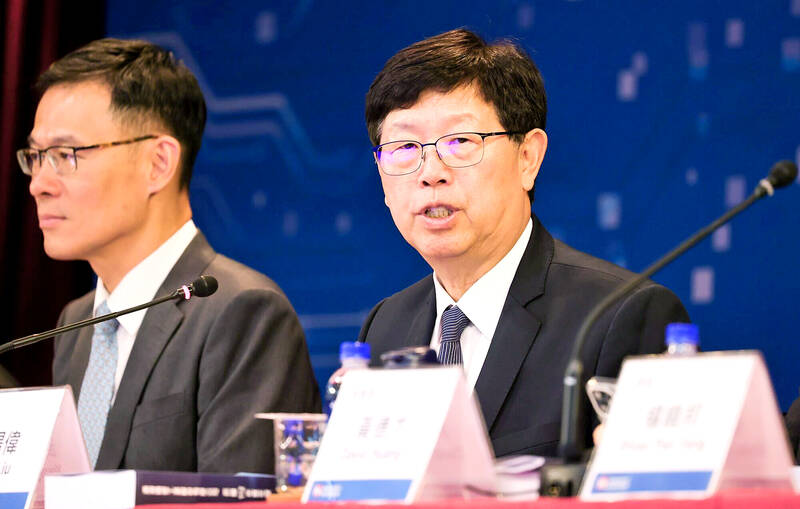Hon Hai Precision Industry Co (鴻海精密) yesterday said revenue is to rise and surpass NT$7 trillion (US$215.92 billion) next year, driven by a surge in demand for artificial intelligence (AI)-enabled servers.
That means overall revenue would swell about 13.64 percent in the two-year period to next year, compared with NT$6.16 trillion generated last year.
Hon Hai attributed the revenue growth to rapidly growing AI server revenue.

Photo: I-Hwa Cheng, Bloomberg
About NT$1 trillion of the revenue next year would come from AI servers, more than triple the NT$300 billion last year, Hon Hai chairman Young Liu (劉揚偉) said.
AI server revenue would soar about 40 percent this year compared with last year, Liu said.
Hon Hai is to ship the first batch of AI servers powered by Nvidia’s latest AI chip, the GB200, in the second half of this year.
“AI servers will become the next NT$1 trillion segment,” Liu told shareholders at the firm’s annual general meeting. “Last year, the group made more than NT$6 trillion [in revenue]. Because of AI, in the near term, we look to reach NT$7 trillion.”
AI servers are one of the key growth drivers for Hon Hai, Liu said.
The AI industry would exceed US$100 trillion over the longer term, Liu quoted Nvidia Corp CEO Jensen Huang (黃仁勳) as saying during a dinner with local AI server partners.
Some research houses forecast the global AI industry is to expand to more than US$1 trillion in revenue in the next seven or eight years, with half of the amount coming from hardware, Liu said.
Talking about Hon Hai’s partnerships with Nvidia, Liu said that the company plans to showcase its first electric vehicle software platform, HHEV.OS, in October.
Hon Hai is also collaborating with Nvidia in developing generative AI software for electric cars and creating robotic manufacturing systems with AI features, he said.
Hon Hai has made progress in growing its electric vehicle business and is set to land new supply contracts with two traditional automakers from Japan in the second half of this year, Liu said.
The company seeks orders to make electric cars for other automakers.
After multiple years of efforts to sell its electric vehicles overseas, Hon Hai said it expects its electric cars to become available in Southern Asian countries soon.
Next year, its electric vehicles would hit the US market, the company added.
In response to shareholders’ concern about Sharp Corp’s exit from the display market and its impact on Hon Hai, Liu said that Hon Hai would play a more active role in the Japanese company’s management and board, following a major reshuffle this month.
Hon Hai is the biggest shareholder of Sharp, owning a stake of about 34 percent.
Shareholders of Hon Hai yesterday approved a cash dividend distribution of NT$5.4 per share, the highest since 1991. That represented a payout ratio of 52.68 percent, compared with Hon Hai’s earnings per share of NT$10.25.

South Korea’s equity benchmark yesterday crossed a new milestone just a month after surpassing the once-unthinkable 5,000 mark as surging global memory demand powers the country’s biggest chipmakers. The KOSPI advanced as much as 2.6 percent to a record 6,123, with Samsung Electronics Co and SK Hynix Inc each gaining more than 2 percent. With the benchmark now up 45 percent this year, South Korea’s stock market capitalization has also moved past France’s, following last month’s overtaking of Germany’s. Long overlooked by foreign funds, despite being undervalued, South Korean stocks have now emerged as clear winners in the global market. The so-called “artificial intelligence

CONFUSION: Taiwan, Japan and other big exporters are cautiously monitoring the situation, while analysts said more Trump responses ate likely after his loss in court US trading partners in Asia started weighing fresh uncertainties yesterday after President Donald Trump vowed to impose a new tariff on imports, hours after the Supreme Court struck down many of the sweeping levies he used to launch a global trade war. The court’s ruling invalidated a number of tariffs that the Trump administration had imposed on Asian export powerhouses from China and South Korea to Japan and Taiwan, the world’s largest chip maker and a key player in tech supply chains. Within hours, Trump said he would impose a new 10 percent duty on US imports from all countries starting on

Chinese artificial intelligence (AI) start-up DeepSeek’s (深度求索) latest AI model, set to be released as soon as next week, was trained on Nvidia Corp’s most advanced AI chip, the Blackwell, a senior official of US President Donald Trump’s administration said on Monday, in what could represent a violation of US export controls. The US believes DeepSeek will remove the technical indicators that might reveal its use of American AI chips, the official said, adding that the Blackwells are likely clustered at its data center in Inner Mongolia, an autonomous region of China. The person declined to say how the US government received

Like many of us who are mindful of our plastic consumption, Beth Gardiner would take her own bags to the supermarket and be annoyed whenever she forgot to do so. Out without her refillable bottle, she would avoid buying bottled water. “Here I am, in my own little life, worrying about that and trying to use less plastic,” she says. Then she read an article in this newspaper, just over eight years ago, and discovered that fossil fuel companies had plowed more than US$180 billion into plastic plants in the US since 2010. “It was a kick in the teeth,” Gardiner